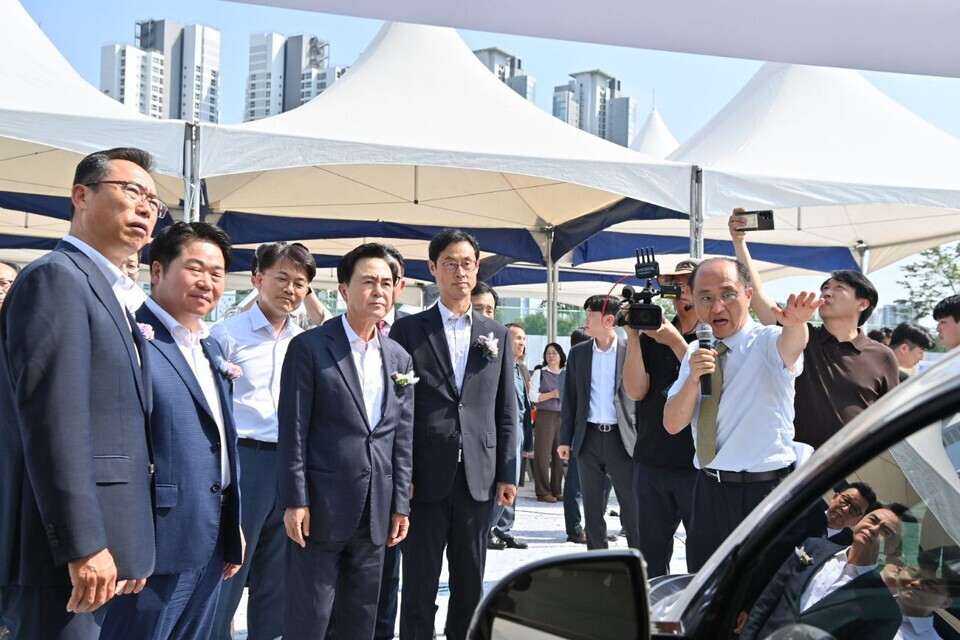
Cheonan-Asan, Chungnam – Chungnam Province has officially broken ground on the 'Autonomous Driving and Automotive Semiconductor Comprehensive Support Center,' marking Korea's first facility dedicated to providing end-to-end support for automotive semiconductors. With a total investment of 74 billion KRW, the center, located near KTX Cheonan-Asan Station, is slated for completion in 2026. This initiative is expected to become a pivotal hub for the rapidly evolving future mobility industry, enhancing global market competitiveness and fostering new growth engines.
Automotive Semiconductors: The Core of the Future Mobility Era
The automotive industry is undergoing a dramatic paradigm shift towards eco-friendly electric vehicles and autonomous driving, significantly elevating the importance of automotive semiconductors. These non-memory (system) semiconductors, integrated into automotive electronic control units for engines, transmissions, and instrument panels, serve as the brain of future mobility. While internal combustion engine vehicles require approximately 200 semiconductors, electric vehicles need 400-500, and Level 3 autonomous vehicles demand over 2,000, indicating an explosive increase in demand.
According to global market research firms, the global automotive semiconductor market is projected to grow rapidly to an estimated 175 billion USD (approximately 240 trillion KRW) by 2040. However, South Korea currently imports about 98% of its automotive semiconductors, highlighting the urgent need for domestic supply chain stabilization and technological self-reliance.
Enhancing Competitiveness through End-to-End Support System
To address this challenge, the Autonomous Driving and Automotive Semiconductor Comprehensive Support Center will be Korea's first institution to provide end-to-end safety testing and evaluation support for autonomous driving and automotive semiconductors. The center will offer safety and reliability testing and evaluation to meet international standards for automotive semiconductor functional safety. It will also support operational safety perception and performance verification testing and evaluation for autonomous vehicles, along with cyber security testing and evaluation in line with international standards for autonomous vehicle semiconductors. These functions are expected to play a critical role in invigorating the future mobility industry.
The center will be built on a 5,696 ㎡ site in Jangjae-ri, Baebang-eup, Asan City, with a total floor area of 4,431 ㎡. It will feature state-of-the-art facilities, including semiconductor electrical and physical analysis labs, environmental/durability/performance testing and evaluation labs, quality inspection/simulation technology evaluation labs, and tenant company offices, along with 130 types of equipment. The Korea Automotive Technology Institute will be responsible for its operation, with approximately 50 specialized personnel to be deployed.
To further strengthen the center's capabilities, Chungnam Province has already secured and is pursuing three national public bidding projects: establishing an innovation base for automotive semiconductor functional safety and reliability, building a verification base for autonomous driving perception and operational safety performance, and creating a security evaluation base for autonomous vehicle system semiconductors. The total budget allocated for the center's construction and these projects amounts to 74 billion KRW.
Chungnam Expected to Emerge as a Hub for Future Mobility
During the groundbreaking ceremony held in Baebang, Asan on June 9, Chungnam Governor Kim Tae-heum stated, "Early this year, I rode a Waymo autonomous taxi in San Francisco and strongly felt the urgency to prepare quickly. Today, we've set the ball rolling." He emphasized, "With the groundbreaking of this center, Chungnam will move beyond being a car parts production base to become a core hub for manufacturing the brains of automobiles."
Governor Kim further added, "We will actively build an industrial ecosystem by promptly developing the future mobility industry-specific national industrial complexes attracted to Cheonan and Hongseong, expanding the KAIST Mobility Institute in Naepo, and accelerating the establishment of a future aviation mobility hub in Seosan." This statement underscores his strong commitment to fostering Chungnam as a hub for the future mobility industry.
Upon the center's full operation by the end of 2026, Chungnam is expected to attract automotive semiconductor-related companies and discover new business opportunities, thus becoming a pivotal center for the future mobility industry. Technologically, the establishment of this advanced industrial base is projected to enable the province to secure global competitiveness in future automotive semiconductor technologies and achieve technological advancement. Furthermore, the attraction of specialized personnel is anticipated to strengthen regional industrial competitiveness and provide a first-mover advantage in the future automotive artificial intelligence (AI) semiconductor sector.
[Copyright (c) Global Economic Times. All Rights Reserved.]






























